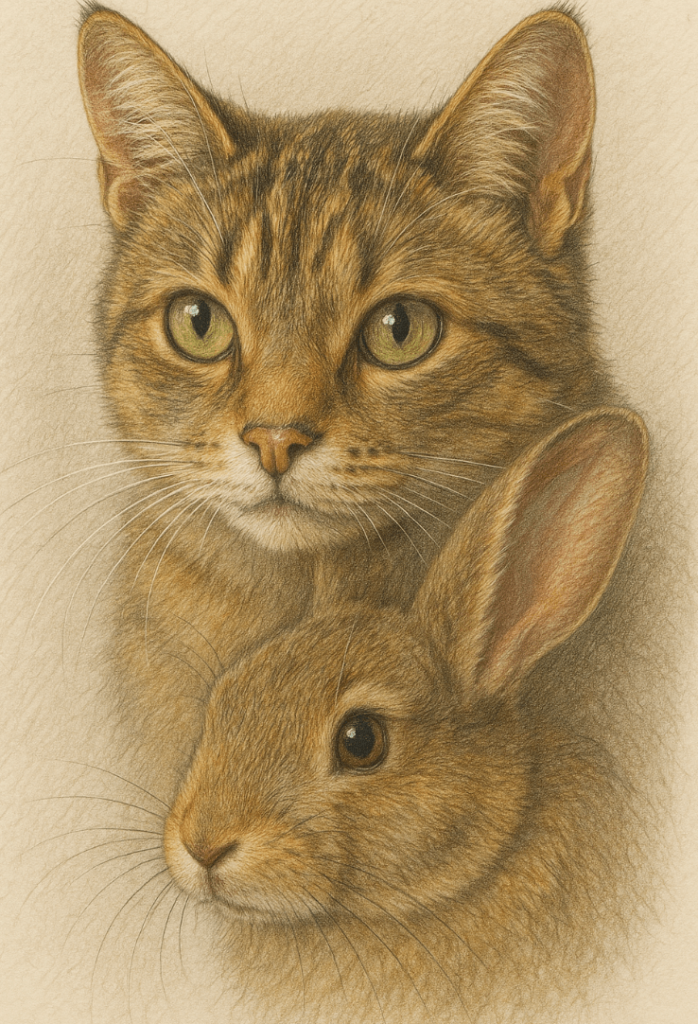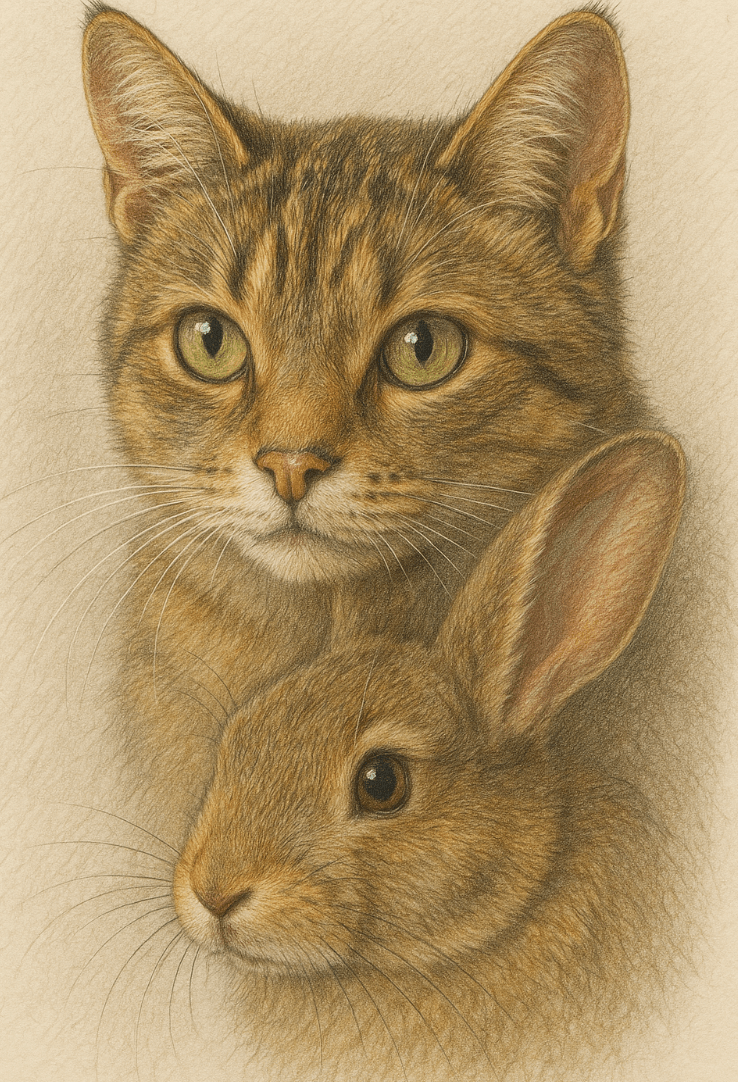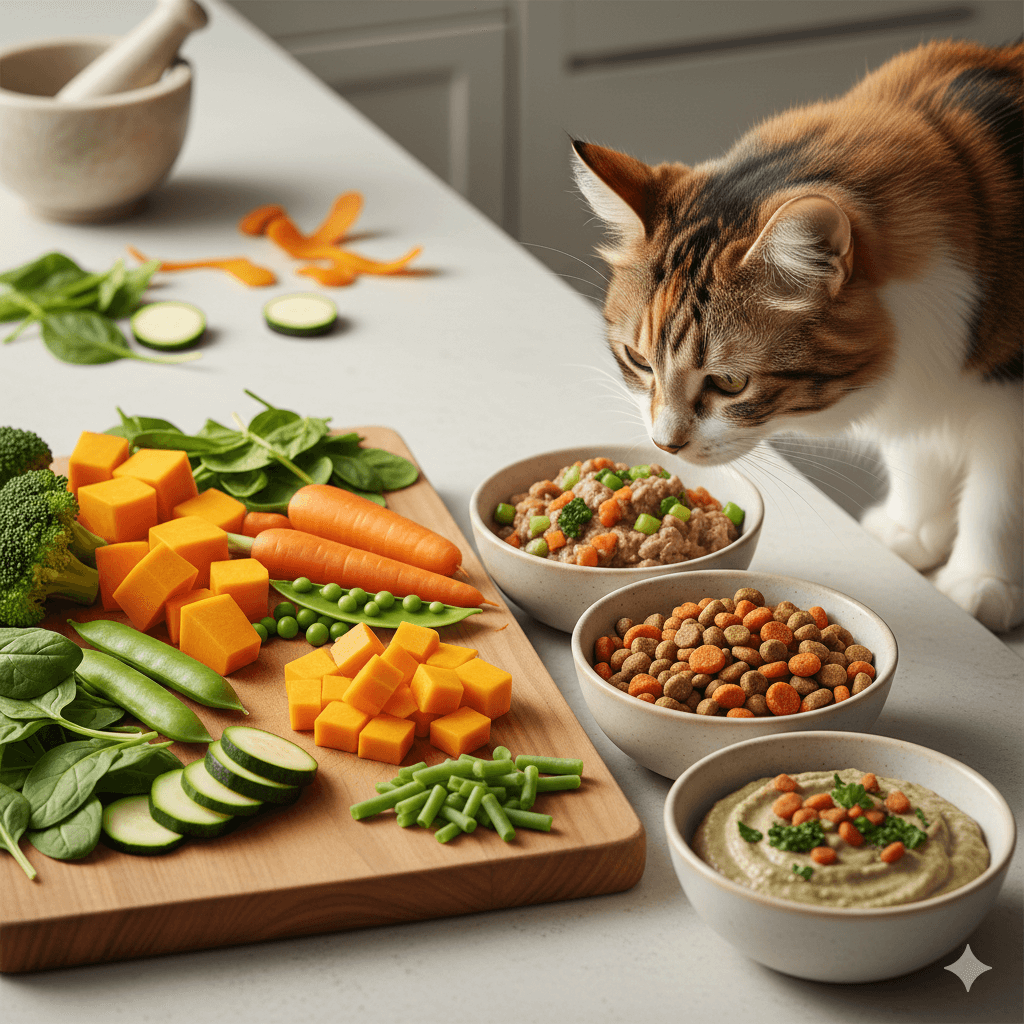Can Cats Eat Rabbits? Understanding the Dynamics
Cats are natural-born hunters, and their instincts often lead them to chase small prey, including rabbits. But can cats actually eat rabbits, and is it safe for them to do so? While domesticated cats typically rely on commercial cat food for their nutritional needs, their wild counterparts or outdoor cats may occasionally hunt and consume rabbits. This raises important questions about whether rabbits are a suitable food source for cats, potential risks involved, and how pet owners should respond if their cat shows interest in rabbits. In this blog post, we’ll explore everything you need to know about cats and rabbits, from dietary considerations to safety precautions, ensuring your feline friend stays healthy and happy.
Is Rabbit Safe for Cats to Eat?
While rabbits are not toxic to cats, there are several factors to consider before allowing your cat to consume rabbit meat. Here’s what you need to know about the safety of rabbits as a food source for cats.
Nutritional Value of Rabbit Meat:
Rabbit meat is high in protein and low in fat, making it a nutritious option if prepared properly.Risk of Parasites and Diseases:
Wild rabbits may carry parasites like fleas or ticks, as well as diseases such as tularemia, which can be transmitted to cats.Raw vs. Cooked Rabbit:
Raw rabbit poses a higher risk of bacterial contamination, while cooked rabbit is safer but should be free of seasoning or additives harmful to cats.Potential Allergies or Sensitivities:
Some cats may have allergic reactions or digestive issues when introduced to new proteins like rabbit meat.Ethical and Practical Concerns:
Feeding cats hunted rabbits raises ethical questions and practical challenges, especially for indoor or urban pet owners.
While rabbit meat can be safe for cats under certain conditions, it’s essential to weigh these factors carefully before offering it as part of their diet.
Signs Your Cat May Have Eaten Rabbit (and What to Do)
If your cat has access to the outdoors or hunts small animals, they may occasionally catch and eat rabbits. Here are signs that your cat has consumed rabbit meat and steps to take if this occurs.
Vomiting or Diarrhea:
These symptoms could indicate that your cat has eaten something unsafe, such as spoiled rabbit meat or bones.Excessive Licking or Drooling:
Drooling might suggest irritation caused by sharp bone fragments or foreign objects lodged in their mouth.Lethargy or Weakness:
A sudden lack of energy could signal illness or infection from consuming contaminated rabbit meat.Behavioral Changes:
Restlessness, aggression, or hiding may indicate discomfort or pain related to their recent meal.Difficulty Eating or Swallowing:
This could mean your cat has ingested something that’s causing blockages or injuries in their digestive tract.
If you notice any of these signs, consult your veterinarian promptly to rule out serious complications.
Check this guide 👉Can Cats Eat Slugs? Best 7 Expert Tips!
Check this guide 👉Can Cats Eat Vegetable Oil? Best 7 Expert Tips!
Check this guide 👉Can Cats Eat Jackfruit? Best 7 Expert Tips!

Benefits of Feeding Rabbit Meat (When Prepared Safely) | Risks of Feeding Wild Rabbits to Cats |
|---|---|
High-quality protein source | Risk of parasites like fleas or ticks |
Low-fat content ideal for weight management | Potential exposure to zoonotic diseases |
Hypoallergenic alternative for sensitive stomachs | Sharp bones can cause choking or internal damage |
Contains essential vitamins and minerals | Raw meat increases risk of bacterial infections |
Can satisfy natural hunting instincts | Ethical concerns about encouraging hunting |
How to Safely Introduce Rabbit Meat to Your Cat’s Diet
If you’re considering adding rabbit meat to your cat’s diet, it’s crucial to do so safely and responsibly. Follow these guidelines to minimize risks and ensure your cat enjoys the benefits without harm.
Choose Commercially Available Rabbit Food:
Opt for pre-packaged, vet-approved rabbit-based cat food rather than feeding raw or hunted rabbits.Cook Thoroughly Without Seasonings:
If preparing rabbit meat at home, cook it plain without salt, spices, or oils that could upset your cat’s stomach.Start with Small Portions:
Introduce rabbit meat gradually in small amounts to monitor your cat’s reaction and avoid digestive upset.Check for Bones or Foreign Objects:
Remove all bones, fur, and other indigestible parts before serving to prevent choking or injury.Consult Your Veterinarian First:
Always seek professional advice before making significant changes to your cat’s diet.
By following these steps, you can safely incorporate rabbit meat into your cat’s meals if appropriate for their health needs.
Preventing Your Cat from Hunting Rabbits
For outdoor or semi-outdoor cats, preventing them from hunting rabbits is key to avoiding potential dangers. Here are some strategies to keep your cat safe and discourage unwanted behavior.
Supervise Outdoor Time:
Keep an eye on your cat during outdoor adventures to intervene if they show interest in chasing rabbits.Use Enclosures or Leashes:
Provide secure outdoor enclosures or use a leash to limit their range and protect local wildlife.Provide Mental Stimulation Indoors:
Engage your cat with interactive toys, puzzles, and playtime to redirect their hunting instincts indoors.Install Deterrents in Your Yard:
Use motion-activated sprinklers or noise devices to scare away rabbits and reduce temptation.Train Recall Commands:
Teach your cat to come when called, allowing you to bring them back before they pursue prey.
Taking these precautions helps maintain harmony between your cat and the surrounding ecosystem.
Common Misconceptions About Cats Eating Rabbits
Several myths surround the topic of cats eating rabbits, leading to confusion among pet owners. Clarifying these misconceptions ensures better decision-making for your feline companion.
Myth: All Cats Are Natural Hunters of Rabbits:
While many cats have strong hunting instincts, not all are skilled or interested in catching rabbits specifically.Myth: Rabbit Meat Is Always Safe for Cats:
Without proper preparation, rabbit meat can pose significant health risks, including parasitic infections.Myth: Feeding Rabbit Will Make My Cat More Aggressive:
While hunting behaviors may increase temporarily, aggression toward humans is unlikely due to diet alone.Myth: Outdoor Cats Need to Hunt to Stay Healthy:
Domesticated cats can thrive on balanced diets without needing to supplement with hunted prey.Myth: Rabbits Are Easy Prey for Cats:
Rabbits are fast and agile, making them challenging targets even for skilled feline hunters.
Understanding these realities helps dispel myths and fosters informed choices about your cat’s diet and behavior.
Health Risks Associated with Cats Eating Wild Rabbits
Allowing your cat to consume wild rabbits introduces several health risks that every pet owner should be aware of. Taking preventive measures minimizes these dangers significantly.
Tularemia (Rabbit Fever):
A bacterial disease carried by rabbits that can be transmitted to cats through bites, scratches, or consumption of infected meat.Parasite Infestations:
Fleas, ticks, and intestinal worms found on rabbits can easily transfer to cats, causing discomfort and illness.Sharp Bone Fragments:
Ingesting rabbit bones can lead to choking, internal punctures, or blockages requiring surgical intervention.Bacterial Infections from Raw Meat:
Pathogens like Salmonella or E. coli present in raw rabbit meat can cause severe gastrointestinal distress in cats.Toxins from Environmental Contaminants:
Pesticides or pollutants absorbed by rabbits may indirectly harm cats who consume them.
Being vigilant about these risks ensures your cat avoids unnecessary exposure to potentially life-threatening hazards.
Alternatives to Satisfy Your Cat’s Hunting Instincts
Instead of letting your cat hunt rabbits, there are plenty of alternatives to channel their natural instincts in healthier and safer ways.
Interactive Toys:
Feather wands, laser pointers, and motorized mice mimic the thrill of the chase without harming real animals.Food Puzzle Games:
Hide treats inside puzzle feeders or scatter kibble around the house to encourage foraging behavior.Catnip-Filled Plush Toys:
Soft toys infused with catnip stimulate playful “hunting” sessions indoors.Window Perches for Bird Watching:
Install perches near windows where your cat can observe birds and squirrels safely.Training Sessions with Treat Rewards:
Teaching tricks or commands provides mental stimulation and satisfies their need for engagement.
These alternatives allow your cat to express their innate behaviors while keeping both them and local wildlife safe.
Frequently Asked Questions About Cats and Rabbits
Can cats eat raw rabbit meat?
No, raw rabbit meat carries a high risk of bacterial contamination and should be avoided unless professionally processed.
What should I do if my cat catches a rabbit?
Monitor your cat closely for signs of illness and contact your veterinarian if you notice anything unusual.
Are there commercial cat foods made with rabbit?
Yes, some brands offer hypoallergenic formulas featuring rabbit meat as the primary protein source.
Will eating rabbits make my cat aggressive?
Not necessarily, but consuming prey animals may heighten their predatory instincts temporarily.
How can I stop my cat from hunting rabbits?
Limit outdoor access, provide enrichment indoors, and supervise their activities to discourage hunting behavior.
Balancing Instincts and Safety When It Comes to Cats and Rabbits
Cats’ natural instincts to hunt and eat small prey like rabbits are deeply ingrained, but as responsible pet owners, it’s our duty to balance those instincts with safety and care. Whether you’re considering feeding rabbit meat to your cat or trying to prevent them from hunting live rabbits, understanding the risks and benefits is essential. By staying informed and proactive, you can ensure your cat remains healthy, happy, and harmonious within their environment. Remember, every decision should prioritize your pet’s well-being while respecting the delicate balance of nature.
Can a Cat Be Tested for Rabies? Best 7 Expert Tips! – Learn if testing is possible, understand the process, and discover prevention tips to keep your cat safe from rabies.
Can a Dog Be Tested for Rabies? Best 7 Expert Tips! – Learn how rabies testing works, why it’s critical, and what every dog owner needs to know.
Best Vegetables for Cat Food: Best 7 Expert Tips! – Discover safe, nutritious veggies to boost your cat’s diet, support digestion, and enhance overall health naturally.
Best Vegetables for Dog Food: Best 7 Expert Tips! – Discover safe, nutritious veggies to boost your dog’s diet, support digestion, and enhance overall health naturally.





